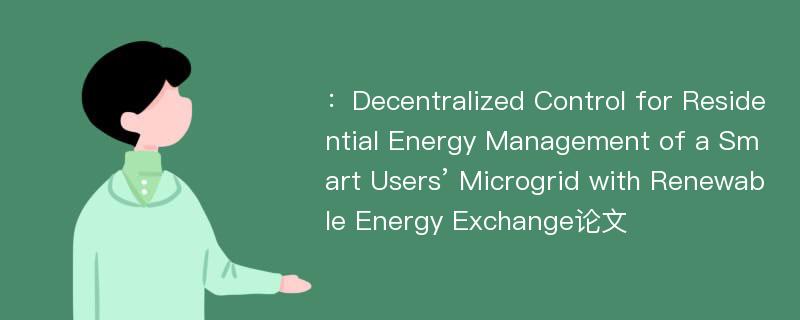
本文主要研究内容
作者(2019)在《Decentralized Control for Residential Energy Management of a Smart Users’ Microgrid with Renewable Energy Exchange》一文中研究指出:This paper presents a decentralized control strategy for the scheduling of electrical energy activities of a microgrid composed of smart homes connected to a distributor and exchanging renewable energy produced by individually owned distributed energy resources. The scheduling problem is stated and solved with the aim of reducing the overall energy supply from the grid, by allowing users to exchange the surplus renewable energy and by optimally planning users’ controllable loads. We assume that each smart home can both buy/sell energy from/to the grid taking into account time-varying non-linear pricing signals. Simultaneously, smart homes cooperate and may buy/sell locally harvested renewable energy from/to other smart homes. The resulting optimization problem is formulated as a non-convex non-linear programming problem with a coupling of decision variables in the constraints. The proposed solution is based on a novel heuristic iterative decentralized scheme algorithm that suitably extends the Alternating Direction Method of Multipliers to a non-convex and decentralized setting. We discuss the conditions that guarantee the convergence of the presented algorithm. Finally, the application of the proposed technique to a case study under several scenarios shows its effectiveness.
Abstract
This paper presents a decentralized control strategy for the scheduling of electrical energy activities of a microgrid composed of smart homes connected to a distributor and exchanging renewable energy produced by individually owned distributed energy resources. The scheduling problem is stated and solved with the aim of reducing the overall energy supply from the grid, by allowing users to exchange the surplus renewable energy and by optimally planning users’ controllable loads. We assume that each smart home can both buy/sell energy from/to the grid taking into account time-varying non-linear pricing signals. Simultaneously, smart homes cooperate and may buy/sell locally harvested renewable energy from/to other smart homes. The resulting optimization problem is formulated as a non-convex non-linear programming problem with a coupling of decision variables in the constraints. The proposed solution is based on a novel heuristic iterative decentralized scheme algorithm that suitably extends the Alternating Direction Method of Multipliers to a non-convex and decentralized setting. We discuss the conditions that guarantee the convergence of the presented algorithm. Finally, the application of the proposed technique to a case study under several scenarios shows its effectiveness.
论文参考文献
论文详细介绍
论文作者分别是来自IEEE/CAA Journal of Automatica Sinica的,发表于刊物IEEE/CAA Journal of Automatica Sinica2019年03期论文,是一篇关于,IEEE/CAA Journal of Automatica Sinica2019年03期论文的文章。本文可供学术参考使用,各位学者可以免费参考阅读下载,文章观点不代表本站观点,资料来自IEEE/CAA Journal of Automatica Sinica2019年03期论文网站,若本站收录的文献无意侵犯了您的著作版权,请联系我们删除。
